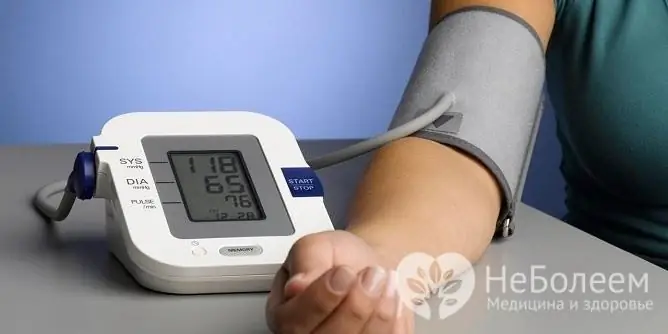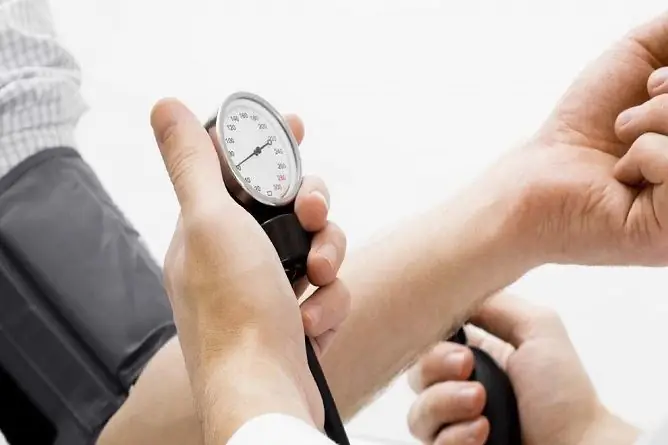- Author Rachel Wainwright [email protected].
- Public 2023-12-15 07:39.
- Last modified 2025-11-02 20:14.
How to raise blood pressure during pregnancy, increase it at home
The content of the article:
- Why does blood pressure drop in pregnant women?
- How to raise blood pressure during pregnancy
- Nutrition for hypotension of pregnant women
- Folk remedies for increasing pressure
- Symptoms of hypotension in pregnant women
- Why is hypotension dangerous?
- Video
How to raise blood pressure during pregnancy is not an idle question, since pregnant women face hypotension very often. This condition in most cases does not pose a danger, but it causes unpleasant weakness and drowsiness.

Low blood pressure is characteristic of early pregnancy, it is manifested by drowsiness and weakness
Blood pressure is an indicator that is recommended to be regularly monitored during pregnancy, since its significant deviation from the norm can be a sign of pathology and lead to undesirable consequences. Reduced blood pressure (arterial hypotension, hypotension) poses a danger to a pregnant woman and a developing fetus if the decrease is significant and remains at this level for a long time.
Why does blood pressure drop in pregnant women?
Low blood pressure in early pregnancy is often recorded and is usually associated with physiological changes, namely hormonal changes in the body.
A short-term decrease in blood pressure can occur when a pregnant woman is in a hot and / or stuffy room, fatigue, and irregular food intake.
Other reasons for lowering blood pressure during pregnancy can include:
- sedentary lifestyle;
- dehydration of the body;
- disorders of the cardiovascular system;
- infectious process in the body;
- endocrine disorders (insufficiency of the adrenal glands, thyroid gland).
Blood pressure in the second half of pregnancy can decrease during a night's sleep if a woman sleeps on her back, since in this case the fetus compresses the vena cava, which leads to impaired blood circulation.
How to raise blood pressure during pregnancy
What to do if the pressure during pregnancy dropped suddenly, there was a sharp weakness, darkening in the eyes, dizziness? In this case, you need to sit down or take a horizontal position, provide an influx of fresh air, drink a cup of sweet black tea. You can massage the area between the upper lip and nose in a clockwise direction. These measures are usually enough to quickly normalize blood pressure.
If we are not talking about a sharp and strong decrease, but about a relatively long-term condition, a lifestyle correction is necessary. A pregnant woman with hypotension should spend a lot of time outdoors, as her body needs an increased supply of oxygen, but should not move away from home alone (pressure can drop dramatically during a walk).

Physical therapy will help normalize blood pressure
A complex of physiotherapy exercises is shown, which is carried out under the guidance of an experienced instructor in an antenatal clinic or a school of parents.
You need to sleep at least 9 hours a day.
Work on the night shift, heavy types of work are contraindicated.
What pills can be used for hypotension in pregnant women should be decided exclusively by a qualified specialist, since uncontrolled intake of drugs is dangerous. The use of a number of drugs in early pregnancy has a negative effect on the condition of the developing fetus, since it is during this period that the internal organs and systems are laid. It should be noted that in the overwhelming majority of drug treatment of hypotonia in pregnant women, it is possible to raise the pressure during pregnancy at home by changing the lifestyle and diet.
Nutrition for hypotension of pregnant women
First of all, pregnant women with hypotension are shown an abundant drinking regimen (if there are no contraindications from the urinary system). What can you drink? Black, green or ginger tea with cinnamon and honey, compotes, fruit drinks, fruit and vegetable juices, hot hibiscus tea (cold lowers blood pressure), mineral water. Natural coffee for pregnant women can be consumed in a limited way, 1-2 cups a day, it is recommended to add milk and sugar to it. Instant coffee is contraindicated.
The diet is recommended to include iodized salt (up to 10 g per day), meat, beef liver, fish, butter, fresh fruits, vegetables and berries, herbs, dairy products. Nutrition should be varied and balanced, fully covering the needs of the body during this period.

Natural coffee with milk will help to raise pressure
You need to eat regularly, observing the regimen - 5-6 times a day in small portions (3 main meals + 2-3 snacks) at about the same time. You should not take long breaks between meals, this can cause a sharp drop in blood pressure. If a pregnant woman leaves home for a long time, it is advisable to have a small snack with her, for example, a banana, biscuits or a bottle of drinking yogurt.
Folk remedies for increasing pressure
Traditional medicine can be effective in combating hypotension, but it should be remembered that they are not completely harmless, so they can be used only after consulting a doctor with whom the pregnant woman is registered.
If your blood pressure drops sharply, you can apply a drop of jasmine or clove essential oil to your temples.
According to reviews, a tincture of Chinese magnolia vine or ginseng helps well with low pressure; a few drops of it are taken in the morning on an empty stomach, dissolving in a spoonful of water or dropping on a piece of sugar.
Decoctions and infusions from the following medicinal plants have a tonic effect: St. John's wort, prickly tartar, yarrow, lovage, common mordovia, Rhodiola rosea.
If a pregnant woman with low blood pressure suffers from bouts of dizziness, traditional medicine suggests making foot compresses with apple cider vinegar (applied to the heels).
Symptoms of hypotension in pregnant women
Often, there are no clinical signs of low blood pressure during pregnancy. To determine possible hypotension, blood pressure should be measured daily in the morning at about the same time. In this case, it is important to know your individual working (normal) pressure, since the pressure is considered normal in a rather wide range - from 140/90 to 110/60 mm Hg. Art. Thus, if for a woman the norm is 130/80 mm Hg. Art, the pressure of 110/60 will be reduced for her, although it will correspond to the medical standard.

It is recommended to measure blood pressure daily in the morning.
Symptoms of low blood pressure in a pregnant woman include weakness, fatigue, drowsiness, aching headache, dizziness, nausea, tinnitus, shortness of breath with little exertion, heart palpitations.
Hypotension during pregnancy can cause fainting. The following signs may indicate a light-headed state: tachycardia, a throbbing sensation in the temples, increased sweating, darkening of the eyes, chills or fever.
Why is hypotension dangerous?
Prolonged excessively low blood pressure in the expectant mother can cause circulatory disorders, which can lead to intrauterine fetal hypoxia, placental insufficiency. In the later stages, low pressure can cause a frozen pregnancy, premature birth. For this reason, in case of prolonged or significant hypotension, you should urgently consult a doctor in charge of pregnancy.
Video
We offer for viewing a video on the topic of the article.

Anna Aksenova Medical journalist About the author
Education: 2004-2007 "First Kiev Medical College" specialty "Laboratory Diagnostics".
Found a mistake in the text? Select it and press Ctrl + Enter.






